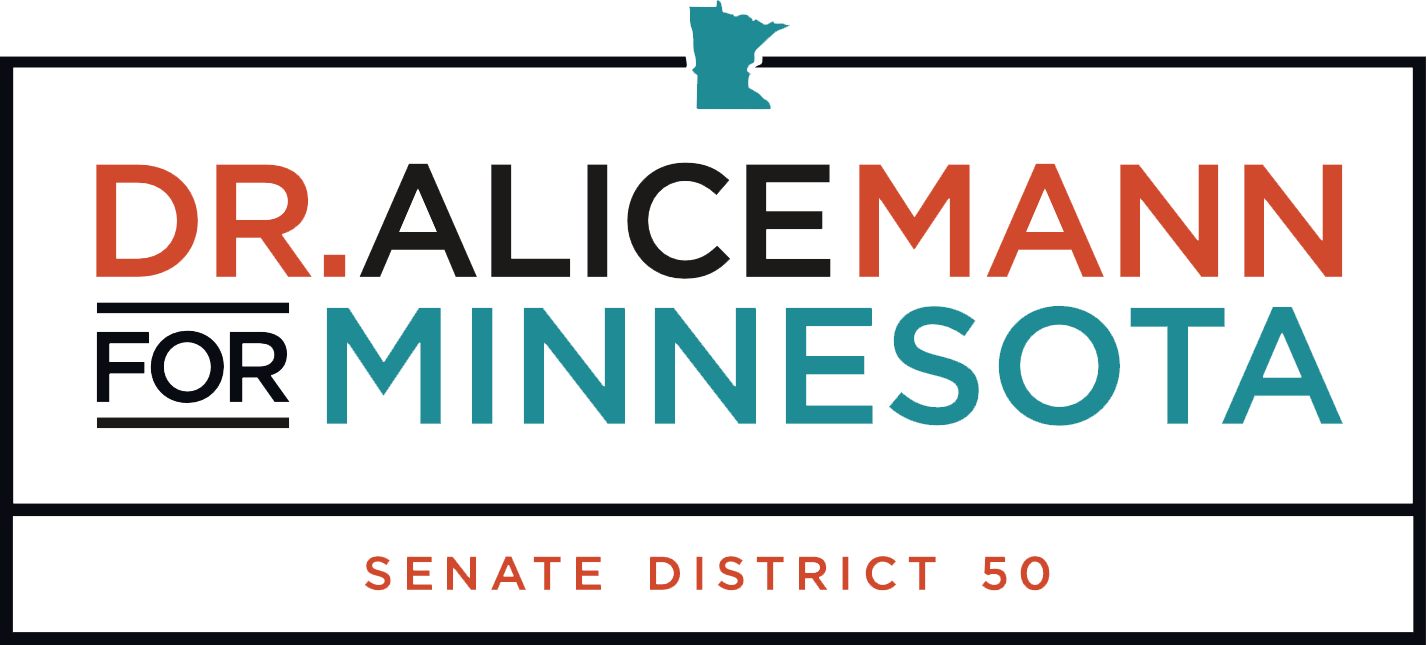Doctor-lawmaker makes an impact quickly
by John Gessner
Mann has eventful first session
The “Mann plan,” a phrase that surfaced at the state Capitol this year, isn’t a formal proposal.
The House of Representatives was debating health care reinsurance when a senior Republican member “who liked to pick on female freshmen on the floor to try to embarrass us” asked DFL Rep. Alice Mann her opinion.
Unfazed, the rookie legislator from Lakeville stated her opposition so assertively that other DFLers deferred to “the Mann Plan” when they rose to speak.
Now the phrase is memorialized on the wall in Mann’s legislative office.
“Because I love it,” said Mann, one of four medical doctors in the Legislature. “I like the support.”
Mann, whose District 56B covers parts of northern Lakeville, southern Burnsville and east-central Burnsville, was part of a suburban DFL Party wave that flipped control of the House in last November’s elections.
She campaigned on universal health coverage for all Minnesotans and was immediately sought for leadership in the new DFL majority. Mann was appointed vice chair of the Health and Human Services Committee’s Finance Division and was chief author of 23 bills in 2019, many health care-related.
Mann is also part of an ad hoc “doctors caucus” of the Legislature’s four docs — three DFL, one Republican — who met periodically during the 2019 session, a fertile one for health care.
The “Mann Plan” episode is “a tribute to the high esteem in which she is held,” Finance Division Chair Rep. Tina Liebling, DFL-Rochester, wrote in an email to the newspaper.
“Unflappable” in committee and on the House floor, Mann “was one of the stars of the legislative session,” Liebling wrote, praising her intelligence and tenacity as well her medical background. “She is very well liked and already highly respected. It is unusual for a first-term legislator to have to much impact so quickly.”
After the session’s conclusion in May, Mann said she’s busy meeting with a range of stakeholders, from insurance company officials to the Alzheimer’s Association, to help shape future health care legislation.
One of the many bills with her name at the top in 2019 was a single-payer bill that would transform health care in Minnesota, both public and private. It’s been introduced for years, Mann said, and she picked it up — but the debate doesn’t begin and end with single-payer.
“This is just a conversation-starter,” said Mann, who quit her Northfield Hospital and Clinics family practice in Lakeville after being elected but is still an emergency room doctor in Northfield. “The issue is, everyone wants more affordable, accessible health care. What are some other options that we can get there? How do we open up the conversation and discuss these things? Because the status quo is not working.”
Probably her signature achievement in 2019 was a measure to help contain spiraling drug prices by regulating pharmacy benefit managers, the middlemen between drug manufacturers, pharmacies and insurance plans. PBMs develop the “formularies,” or lists of drugs, that reach patients through health plans.
“They decide that list largely based these days on how much kickback, or rebates, they receive from the manufacturer,” Mann said. “And they can tell the manufacturer, ‘If you give us X-percentage of the cost of the drug, not only will we put your drug on the formulary, we’ll keep your competitor’s off the formulary.’ ”
There were no guarantees rebates reached patients and wasn’t enough transparency in the industry to follow the money, Mann said. Her bill opens the books of PBMs and gives the commissioner of Human Services power to revoke their licenses to do business in Minnesota, Mann said.
Health care is “a profit-driven market, and patients suffer because of that,” she said. “We took one little bit of our broken health care system, which was the PBM, and we tried to make that a little bit better by making it more fair, more transparent. Now we want to see how much kickback you are getting and how much of that is actually getting passed down to the patient.”
The measure also removes a gag rule that prevented pharmacists from revealing the lowest-cost means of buying prescription drugs, Mann said.
Sponsored in the Senate by Republican Scott Jensen, also a doctor, the measure had wide bipartisan support.
Mann said she was chief author of a measure to lower TEFRA fees by 15 percent. TEFRA allows Medical Assistance eligibility for children with disabilities whose parents have too much income to qualify for MA or other Minnesota health care programs. TEFRA fees are paid to health care providers and cover expenses such as wheelchairs and medications, Mann said.
“I had a lot of people call and just say ‘Thank you, this is going to change our lives,’ ” she said. “That was really special.”
Mann sponsored bipartisan legislation creating a Rare Disease Advisory Council that will share and disseminate information on rare diseases and serve as a resource for families.
She was chief author of a measure restoring funding that was set to expire for Minnesota’s quit-smoking line. And Mann, along with other members of Lakeville’s legislative delegation, secured Metro Mobility service in the city for the first time.
Left undone in 2019, Mann said, was an emergency insulin bill to provide diabetes sufferers with the life-sustaining drug when they can’t afford its spiraling costs.
The Republican-controlled Senate wrote legislation under which taxpayers would cover emergency insulin costs, while the House crafted a bill that would make drug manufacturers liable, Mann said.
“They (Republicans) can make all the excuses they want,” she said. “But at the end of the day, they stopped this bill from passing because of the funding. They didn’t want to ask Big Pharma to pay their share.”
Originally posted at https://www.hometownsource.com/sun_thisweek/community/burnsville/doctor-lawmaker-makes-an-impact-quickly/article_fce73f46-9907-11e9-9b63-af62b299bce4.html.




